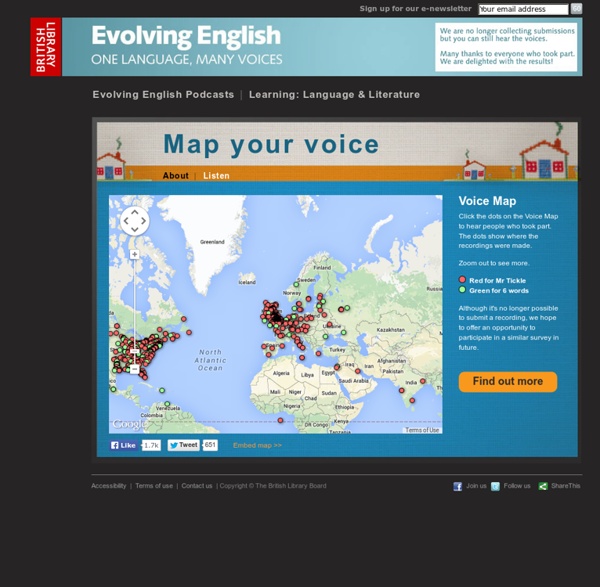



English news and easy articles for students of English Phonesthemic Initial Sounds in English Words | DavidAppleyard.com Sometimes it is possible to have associations about a word in English merely by looking at it or hearing it spoken. On this page I'd like to draw your attention to certain initial sounds that help convey the general gist of some words you may not have met before. J. By listing selected vocabulary items according to their initial-sound associations, I hope to arouse your interest and facilitate memorization. David V. cl- fl- gl- gr- sl- sn- sp- st- str- sw- wh- wr-
PodOmatic | Best Free Podcasts English Listening Lesson Library Online Hello, and welcome to elllo. My name is Todd Beuckens. I've been an ESL teacher for 25 years. I created elllo to provide teachers and students free audio lessons and learning materials not usually found in commercial textbooks. Contact Me Here
Intonation Intonation is crucial for communication. It's also a largely unconscious mechanism, and as such, a complex aspect of pronunciation. It's no surprise that many teachers don't feel confident about tackling it in the classroom. What is intonation? What is intonation? Intonation is about how we say things, rather than what we say. It's divided into phrases, also known as 'tone-units'. Why teach intonation? Intonation exists in every language, so the concept we're introducing isn't new. Awareness of intonation aids communication. Though it's unlikely our learners will need native-speaker-level pronunciation, what they do need is greater awareness of intonation to facilitate their speaking and listening. Can I improve my own awareness of intonation? It's difficult to hear our own intonation. How I help my students Awareness-raising Some techniques I find useful for raising learners' awareness of intonation: Provide learners with models - don't be afraid to exaggerate your intonation. Conclusion
Cisco WebEx Web Conferencing, Online Meetings, Desktop Sharing, Video Conferencing CNN 10 | CNN Listening for Falling and Rising Intonation (AmE) Audio for Falling and Rising Intonation Audio by TriciaG, LibriVox.org Statements Betty lives in \London. Victor works at a \bank. I haven't read this \book. We went to the theater \yesterday. Special questions What is his \name? Where does he \live? When did you \call him? Why are you \late? General questions Do you visit them /often? Have you seen my /keys? Are you ready to /start? Could you give me a /pen, please? Alternative questions Do you want /coffee or \tea? Does he speak /English or \German? Tag questions It's a beautiful \town, \isn't it? She \knows him, /doesn't she? Commands \Stop it! Close your \books. Exclamatory sentences What a wonderful \present! How \nice of you! Direct address /Peter, can you /help me? Mrs. Enumerating /One, /two, /three, /four, \five. She bought /bread, /cheese, /oranges, and \apples. Introductory phrases If he /calls, tell him about the \conference, please. According to his /words, he was at \home.
Debate Forum | Online Debate Community | CreateDebate 273 Free ESL Short, Easy Dialogues, Audio Short, Easy Dialogues 15 topics: 10 to 77 dialogues per topic, with audio HOME – www.eslyes.com Mike email me michaeleslATgmail.com February 22, 2018: "500 Short Stories for Beginner-Intermediate," Vols. 1 and 2, for only 99 cents each! ....Middle of this page.... ....Bottom of this page.... ....To download Audio Files, click here. Dec. 18, 2016. Copyright © 2025. ....Middle of this page.... ....Top of this page.... Little Bird Tales - Home Starfall's Learn to Read with phonics